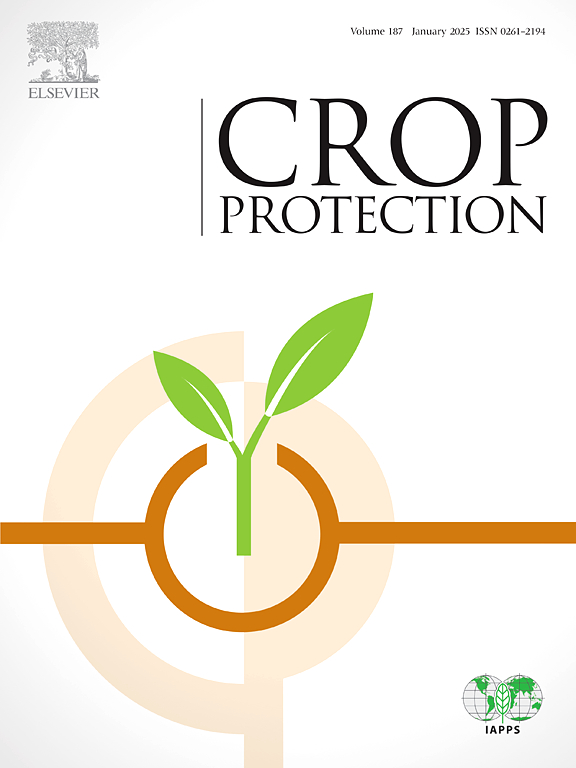Fungicides for the management of blackleg disease of canola caused by Leptosphaeria maculans in the Western Cape province of South Africa
IF 2.5
2区 农林科学
Q1 AGRONOMY
引用次数: 0
Abstract
Blackleg disease, caused by Leptosphaeria maculans, severely impacts canola production in the Western Cape. Fungicides are an important component of integrated management, but little information is available on fungicide efficacy under South African conditions. With decreased sensitivity reported for L. maculans to the demethylation inhibitor (DMI) class fungicides in Australia and Europe, it is important that fungicide sensitivity is also evaluated locally. This study screened 118 L. maculans isolates, collected between 2007 and 2022 from canola growing regions of the Western Cape, for in vitro sensitivity to two active ingredients frequently used in canola production, namely tebuconazole and prothioconazole. Field trials were conducted at four locations in 2022 and 2023 to assess the efficacy of six fungicide products on two canola cultivars. Tebuconazole 50% effective concentrations (EC50) ranged from 144.9 ng/mL to 985.3 ng/mL, which was within the range of EC50 values found for sensitive isolates in similar studies. Tebuconazole EC50 values steadily increased from 2020 to 2022, suggesting a shift in sensitivity. Prothioconazole EC50 values were between 270.3 ng/mL and 1620.4 ng/mL. In the field trials, all fungicide products, except the unregistered product Bumper, were effective in lowering blackleg severity. The cultivar Diamond showed a greater fungicide response than the more resistant cultivar 44Y94. Under higher disease pressure, however, fungicide applications also reduced blackleg severity in 44Y94. When sequences of the CYP51 promotor region were screened for inserts associated with reduced DMI sensitivity, no inserts were detected in local isolates. This study provides a foundation for the effective and sustainable use of fungicides in an integrated blackleg management strategy in South Africa.
南非西开普省由斑点细螺旋体引起的油菜籽黑腿病的杀菌剂管理
由斑点细螺旋体引起的黑腿病严重影响了西开普省的油菜籽生产。杀菌剂是综合管理的重要组成部分,但关于在南非条件下杀菌剂功效的资料很少。在澳大利亚和欧洲,有报道称L. maculans对去甲基化抑制剂(DMI)类杀菌剂的敏感性降低,因此对当地杀菌剂的敏感性进行评估是很重要的。本研究筛选了2007年至2022年间从西开普省油菜籽种植区收集的118株maculans分离株,对油菜籽生产中常用的两种活性成分(即戊康唑和原硫康唑)进行了体外敏感性测试。2022年和2023年在4个地点进行了田间试验,以评估6种杀菌剂产品对两种油菜品种的药效。戊康唑50%有效浓度(EC50)范围为144.9 ~ 985.3 ng/mL,在类似研究中敏感分离株的EC50值范围内。从2020年到2022年,戊康唑的EC50值稳步上升,表明敏感性发生了变化。Prothioconazole的EC50值在270.3 ~ 1620.4 ng/mL之间。在田间试验中,除未注册产品Bumper外,所有杀菌剂均能有效降低黑腿的严重程度。品种Diamond对杀菌剂的反应强于抗病品种44Y94。然而,在较高的疾病压力下,施用杀菌剂也降低了44Y94的黑腿严重程度。当筛选CYP51启动子区域序列中与DMI敏感性降低相关的插入物时,在本地分离株中未检测到插入物。本研究为在南非黑腿综合管理战略中有效和可持续地使用杀菌剂提供了基础。
本文章由计算机程序翻译,如有差异,请以英文原文为准。
求助全文
约1分钟内获得全文
求助全文
来源期刊

Crop Protection
农林科学-农艺学
CiteScore
6.10
自引率
3.60%
发文量
200
审稿时长
29 days
期刊介绍:
The Editors of Crop Protection especially welcome papers describing an interdisciplinary approach showing how different control strategies can be integrated into practical pest management programs, covering high and low input agricultural systems worldwide. Crop Protection particularly emphasizes the practical aspects of control in the field and for protected crops, and includes work which may lead in the near future to more effective control. The journal does not duplicate the many existing excellent biological science journals, which deal mainly with the more fundamental aspects of plant pathology, applied zoology and weed science. Crop Protection covers all practical aspects of pest, disease and weed control, including the following topics:
-Abiotic damage-
Agronomic control methods-
Assessment of pest and disease damage-
Molecular methods for the detection and assessment of pests and diseases-
Biological control-
Biorational pesticides-
Control of animal pests of world crops-
Control of diseases of crop plants caused by microorganisms-
Control of weeds and integrated management-
Economic considerations-
Effects of plant growth regulators-
Environmental benefits of reduced pesticide use-
Environmental effects of pesticides-
Epidemiology of pests and diseases in relation to control-
GM Crops, and genetic engineering applications-
Importance and control of postharvest crop losses-
Integrated control-
Interrelationships and compatibility among different control strategies-
Invasive species as they relate to implications for crop protection-
Pesticide application methods-
Pest management-
Phytobiomes for pest and disease control-
Resistance management-
Sampling and monitoring schemes for diseases, nematodes, pests and weeds.
 求助内容:
求助内容: 应助结果提醒方式:
应助结果提醒方式:


